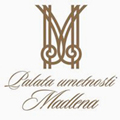The promotion of the book “Ten Myths about Israel” by Ilan Pappe, university professor and historian from Israel, translated into Serbian by Aleksandra Bajazetov and Drinka Gojković, took place on Thursday, 13 February, with the beginning at 7 p.m.
Beside MRS Gojković who presented the book, professor Duško Lopandić, PhD, former ambassador of Serbia to the EU and president of the Forum for International Relations, Nikola Tucakov, MA, from the Institute for European studies, and Dušan Janjić, PhD, from the Forum for Ethnic Relations took part in the discussion which was moderated by MRS Slavka Ilić, editor-in-chief of Zepter Book World.
The idea to publish the book was initiated by Aleksandra Bajazetov, who, together with Drinka Gojković, translated the book as well. MRS Gojković emphasized that Ilan Pappe is not unfamiliar to Serbian reading public, as some of his texts have already been translated into Serbian, while the subject book is important and necessary not only because it opens eyes in so many different manners, but also because it provides an indispensable, novel and engaging historical context which facilitates understanding of complexity of the Israeli-Palestinian relations. MR Nikola Tucakov pointed to the importance of opening archives and making archive materials, i.e. relevant data on the forming of the state of Israel, available 30 years after the founding of the state, which only the new generation of historians, which Ilan Pappe also belongs to, could gain access to. Tucakov questioned Pappe’s methodological framework for historical studies, i.e. opened up space for thinking on whether the terms “apartheid” and “colonialism” could be applied to the relations between the Israeli and the Palestinians, or whether this issue calls for a new terminological deliberation. Dušan Janjić said that the question of Jerusalem as the capital and the attempts to draw borders both within Jerusalem and out of it is not merely the question of territory but rather the question of energy, i.e. water resources. According to Janjić, the book appears to be prophetical, especially in the chapter explaining that the idea about two states is actually a corpse which is occasionally raised up and revived, only to be returned among the dead. Duško Lopandić commented on deliberation of myths and collective perceptions. Lopandić quoted Pappe, who said that the book is not unbiased, but that it is yet another attempt to shift international discourse to the benefit of the occupied and oppressed Palestinians, having in mind that conflicts about the Holy Land (Israel and Palestine) have been taking place for eight decades in continuum. Following the discussion, the audience had the opportunity to ask the panelists questions and listen to engaging and illuminating answers.
Following the book promotion, alongside with the cocktail which was organized for the guests, the visitors had the opportunity to see the newly-opened exhibition of naïve art entitled “My Naïve”, which is set in the harmonious scenery by the swimming pool.
This was the occasion for the audience to enjoy the artistic work of self-taught naïve artists from Kovačica, artists from the Drava river basin region (Hlebina and nearby settlements in Croatia), and other representatives of this art form.











